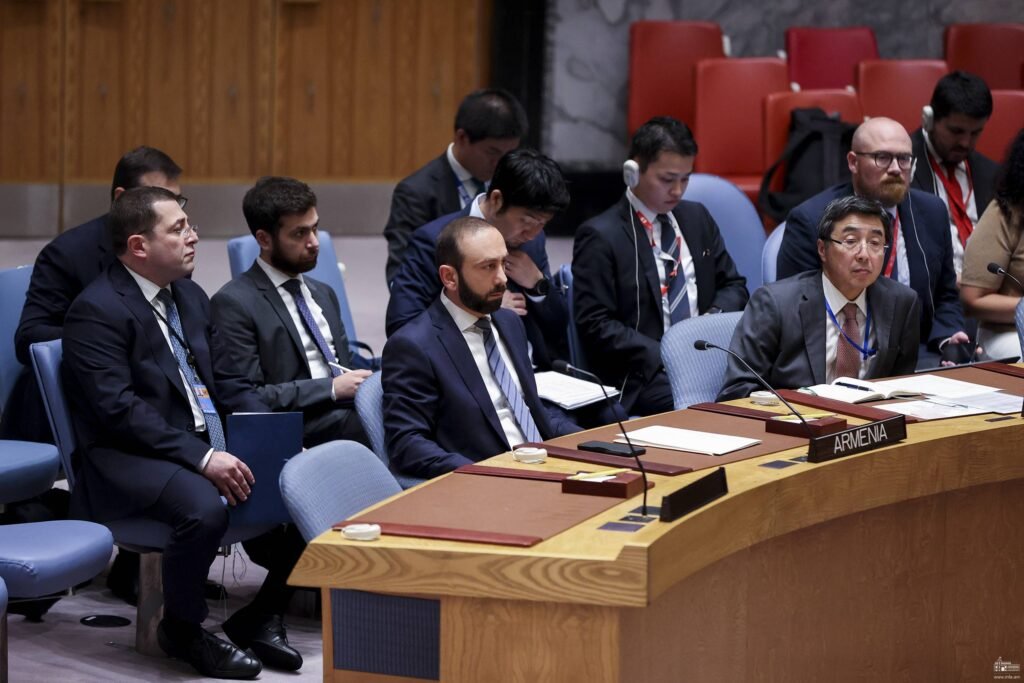The United Nations Security Council is composed of 15 member states. Five are permanent members with veto power (China, France, Russia, the United Kingdom and the United States), and the other 10 serve two-year terms on a rotational basis.
The Security Council’s powers include establishing peacekeeping operations, enacting international sanctions and authorizing military action. It is the only U.N. organ with the authority to issue binding resolutions on member states.
With such extensive responsibilities, the Security Council is the right U.N. body to address Azerbaijan’s blockade of 120,000 Artsakh Armenians, which risks their starvation and thus meets the U.N. definition of the term genocide.
Regrettably, the Armenian government, due to the mismanagement of its approach, mishandled this unique opportunity to get the U.N. body to adopt a resolution urging Azerbaijan to immediately unblock the Berdzor (Lachin) Corridor, under the threat of severe sanctions.
The proper way to have handled the petition to the Security Council would have been for Armenia to prepare the text of a draft resolution, meet with all 15 members, and convince them to agree to the proposed resolution. Since the blockade has been ongoing for eight months, the Armenian government had plenty of time to do this work.
Without any preparations, petitioning the Security Council and expecting a positive outcome is unrealistic and self-defeating. The ambassadors of the 15 member countries always receive advance instructions from their foreign ministries on what to say during the U.N. meetings. If there is a pre-prepared text of a proposed resolution, they are told how to vote. Nothing is decided on the spot during the meeting, and no action can be taken that has not been agreed upon in advance.
The Armenian government should have known these basic facts and taken the proper steps before requesting a Security Council meeting in order to ensure a successful outcome. In the absence of such preparatory work, it is not surprising that the Security Council did not adopt a resolution to warn Azerbaijan that unless it unblocks the Berdzor Corridor immediately, severe sanctions will be imposed.
During the meeting, all 15 member states delivered speeches, many of them urging Azerbaijan to unblock the corridor and resolve issues through peaceful negotiations. The French ambassador delivered the most favorable speech for Armenia, while the Russian ambassador’s remarks were disappointing. When the meeting was over, everyone got up and went home without adopting a resolution to resolve the blockade. Representatives from Azerbaijan and Turkey, which are not members of the Security Council, repeated their myriad of lies about the Berdzor Corridor, denying the obvious facts known to the whole world. To counter Turkey’s remarks, why didn’t Armenia arrange to have Cyprus or Greece attend the meeting to support its position?
Regrettably, the U.N. Security Council member states preferred to pursue their own narrow national interests rather than try to save the lives of Artsakh’s Armenians, thus abdicating their humanitarian responsibility and undermining the integrity of the U.N. Shamefully, the Security Council did not even bother to back up the two decisions of the International Court of Justice on unblocking the Berdzor Corridor.

Armenia’s Foreign Minister Ararat Mirzoyan, who flew to New York on this occasion, gave a proper speech, urging the Security Council “to act as genocide prevention body and not as genocide commemoration, when it might be too late.” Mirzoyan requested that the U.N. dispatch an interagency needs assessment mission to Artsakh, which was ignored. Nevertheless, he failed to request that the U.N. Security Council order Azerbaijan to open the Berdzor Corridor and impose sanctions if it did not comply. On the other hand, the Foreign Minister of Azerbaijan, Jeyhun Bayramov, did not bother to fly from Baku to New York, knowing full well that nothing would happen at the U.N. meeting.
Azerbaijan’s ambassador falsely stated that since Artsakh is a part of his country’s territory, it can do as it pleases, and no one has the right to interfere. The whole world knows that he is completely wrong. Human rights violations are of universal interest. They are of serious concern to the whole world and are not the internal issue of any one country.
While it is true that several ambassadors urged Azerbaijan to unblock the corridor, regrettably, these requests were mere words that fell on deaf ears. Azerbaijan ignored all such requests, as it has rejected similar pleas from several heads of states, foreign ministers, the European Union, European Council, European Court of Human Rights, World Court and Secretary-General of the United Nations. Words without action are meaningless.
To save face, Armenian Prime Minister Nikol Pashinyan told Armenians after the U.N. meeting that now the whole world knows that Azerbaijan, contrary to its denials, is blocking the Berdzor Corridor. This is a meaningless statement, as the world has known that the corridor is blocked. That was not the purpose of the U.N. Security Council meeting. The purpose was to adopt a resolution and impose sanctions on Azerbaijan. Armenia failed to accomplish that important objective.
The meeting was much more than a missed opportunity for Armenia and Artsakh. Raising and then shattering expectations that the Security Council would lift the blockade has further demoralized Armenians worldwide. It would have been far more preferable for Armenia to take no action rather than make a half-baked attempt that caused more damage.
Since last week’s failed meeting, Azerbaijani officials have boasted that no one at the U.N. believed Armenia’s ‘baseless accusations,’ as a result of which no decision was taken. Regrettably, Azerbaijan is now emboldened more than ever to take further aggressive steps against Artsakh and Armenia, knowing full well that no one in the world will take any action against Azerbaijan.


Be the first to comment